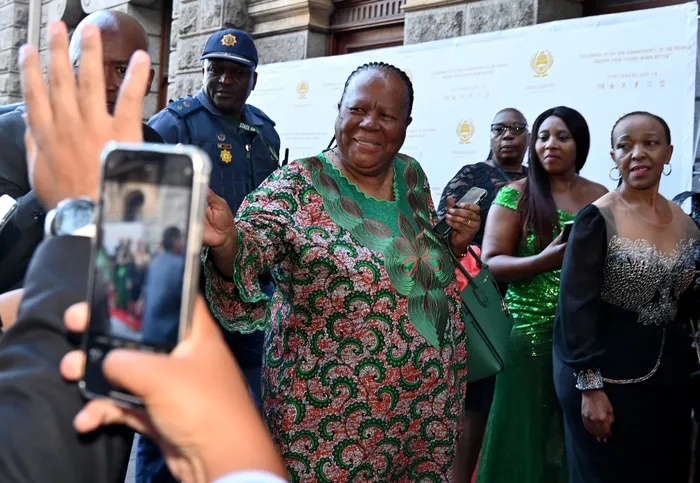SA Foreign Minister Naledi Pandor reveals threats to family in wake of ICJ case against Israel

Picture: Picture: Ayanda Ndamane / Independent Newspapers / Taken on February 2024 – Minister Naledi Pandor arrives for the State of the Nation Address on Thursday at the Cape Town City Hall. Pandor, Minister of International Relations and Co-operation has reported receiving threats against her and her children and has alleged involvement of Israeli intelligence, the writer says.
By Tanupriya Singh
South Africa’s Minister of International Relations and Co-operation, Naledi Pandor, has stated that she and her family have been receiving threats in the aftermath of South Africa’s case against Israel accusing it of violating the Genocide Convention at the International Court of Justice (ICJ).
Speaking to reporters in Cape Town on February 9, Pandor, who has been outspoken and steadfast in her support of the Palestinian people, said that she had to increase her security and that she was worried about her family given that threats on social media had mentioned her children.
“The Israeli agents, intelligence services, this is how they behave, and they seek to intimidate you … we must not be intimidated. There is a cause that is under way,” she said.
“The people of the world and of Palestine didn’t draw back when the apartheid state was at its worst. They stood with the liberation movement so we can’t stand back now. We must be with them and one of the things we must not allow is a failure of courage.”
Not only did Israel call the South African government the “legal arm of Hamas” and spread bizarre misinformation that Iran had somehow funded its case at the ICJ, Pandor stated recently that Israel had also called her an ISIS supporter.
“We will strive on. As long as the people of Palestine know we as South Africa are with them, we will strive on.”
In its initial ruling on January 26, the ICJ had upheld South Africa’s case against Israel, and granted the provisional measures sought by Pretoria, including ordering Israel to take “all measures within its power to prevent the commission of all acts within the scope of the Genocide Convention”. The acts defined included the killing of members of the group (the Palestinian people), causing them physical or mental harm, and imposing on them conditions of life calculated to bring about their physical destruction.
It was almost immediately apparent that Israel was violating the provisional measures, given that it had killed over 373 people within 48 hours of the ruling. “I can’t be dishonest. I believe the rulings of the court have been ignored.” Pandor had said at a press conference at the end of January.
“Hundreds of people have been killed in the last three or four days. And clearly Israel believes it has licence to do as it wishes.”
Nearly 28,000 Palestinians have been killed in Gaza as Israel continues its genocidal war on the besieged enclave. On February 8, the Zionist occupation rejected a ceasefire proposal presented by Hamas on behalf of the Palestinian resistance, a proposal which would have seen the return of all Israeli hostages, the freedom of Palestinian political prisoners, reconstruction, and negotiations towards a “sustainable peace”.
While Israel continues to blatantly flout international law under the diplomatic and military support provided by the United States and its allies, South Africa has also taken the matter to the International Criminal Court (ICC).
Last November, South Africa was among a group of countries who filed a referral to the Court, which is established under the Rome Statute and has jurisdiction over crimes against humanity, war crimes, genocide, and crimes of aggression. The ICC is an independent entity that prosecutes individuals, as opposed to the ICJ, which is a UN institution that settles disputes between states.
However, despite having an open investigation into the situation in Palestine since 2021, Palestinian human rights organisations have accused the ICC’s incumbent chief prosecutor, Karim Khan, of delays and double standards in his handling of the case, particularly in light of the atrocities committed by Israeli forces, and sanctioned by its senior-most leadership, since October 7.
In its case before the Court, South Africa had appealed to the Court to issue an arrest warrant against Israeli Prime Minister Benjamin Netanyahu and to investigate the commission of war crimes, crimes against humanity, and genocide against the Palestinian people.
In the press conference on January 31, Pandor said that a South African delegation had met with Khan and the ICC president, emphasising Pretoria’s “concern at the slow pace of action on matters that we referred to them as urgent matters”.
She said the ICC prosecutor had assured the delegation that the matter was being looked at, however, “What I felt he didn’t answer me sufficiently on was – I asked him why he was able to issue an arrest warrant for Mr Putin while he is unable to do so for the Prime Minister of Israel. He could not answer and did not answer that question.”
This article was first published on Peoples Dispatch